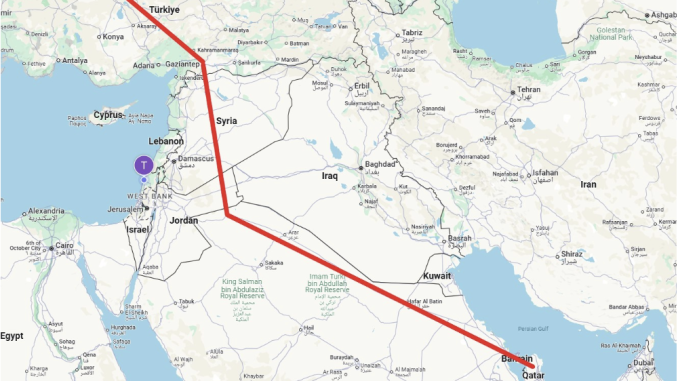
BESA Geo-Energy Insights No. 7, January 13, 2025
EXECUTIVE SUMMARY: The fall of the Assad regime in Syria has revived Turkey’s plans to construct oil and gas pipelines through the country, turning it into a regional “energy corridor” for neighboring states. Some of these plans would offer the Arab Gulf States a more convenient land route for exporting energy to Europe through Turkey, posing a challenge to Israel’s similar aspirations. Israel has other opportunities to export its natural gas to new markets via pipeline, but they pose the risk of undermining Israel’s relationship with Greece and Cyprus. Israel should follow the “pipeline game” in Syria closely to ensure that new economic opportunities in the region don’t pass it by.
The collapse of the Assad regime in December 2024 revived several Turkish-led energy infrastructure projects that had been abandoned due to the Syrian civil war. While some of these projects undermine Israel’s interest in becoming an “energy corridor” between Europe and the Arab Gulf States, others have the potential to open up new markets in the region for Israeli gas and electricity exports. This article will highlight three of these potential projects and examine their implications for Israeli regional interests: 1) a joint Turkey-Qatar gas pipeline through Syria; 2) an extension of the Arab Gas Pipeline to Turkey; and 3) new oil pipelines from the Arab Gulf States to Syria to replace Iranian oil supplies.
- The Turkey-Qatar gas pipeline project through Syria
Soon after the fall of the Assad regime, Turkish media outlets began reporting on their government’s desire to revive an old plan to construct a gas pipeline between Qatar and Turkey through Syria. The pipeline was first announced in 2009 and was primarily promoted by Turkey. Qatar ultimately abandoned it due to technical and political difficulties, including the eruption of the civil war in Syria, high-profile disputes between Qatar and Saudi Arabia and between Turkey and Assad’s regime, and the crash in oil prices in 2014 that put many regional energy infrastructure plans on hold. Now that the Assad regime has fallen and relations between Qatar and Saudi Arabia have warmed, Turkey is again interested in advancing the Turkey-Qatar gas pipeline project.
Proposed Turkey-Qatar gas pipeline

A joint gas pipeline with Qatar would serve several important Turkish interests. It would allow Turkey to strengthen its position as the main transit country for non-Russian gas to Europe; provide Turkey with an additional source of cheap gas to serve southeastern Turkey, which suffers from winter power outages due to unreliable supply from Iran and Iraq; and strengthen Turkish and Qatari ties with the new regime in Syria.
At this stage, there is no clear timeline for the pipeline’s construction and no estimate regarding the expected capacity or cost of such a project. Qatar likely wants to wait and see that the new regime in Syria is able to gain control over the center of the country before it makes any investment decisions. As a rule, energy companies do not invest in multibillion-dollar cross-border gas pipelines if they’re not certain that the transit country will remain stable and reliable for the next 10-15 years, which is the necessary period to recover a pipeline’s cost. This is especially important in areas of central Syria where the proposed pipeline will need to pass – areas that are still seeing activity by ISIS and similar groups and will therefore require strong security guarantees.



Greece and Cyprus need Israel more than Israel needs them economically and both vote against Israel in the U.N. Turkey is a future enemy, next in line after Iran, Hezbollah, Houthis and Hamas. Do the math. This involves long-range planning and investment.